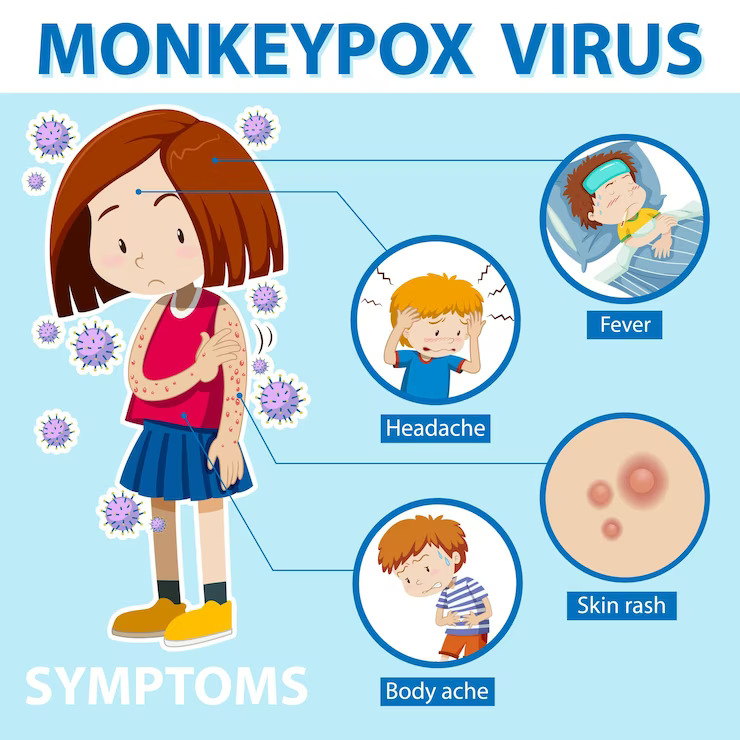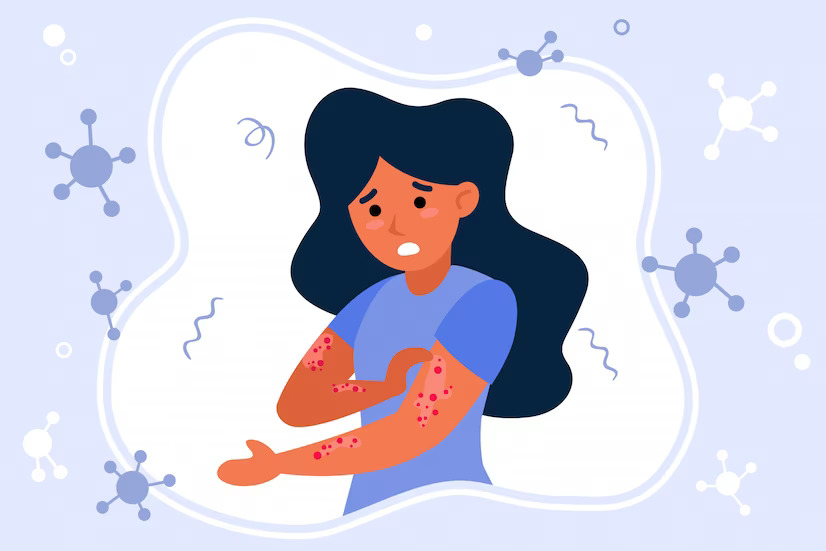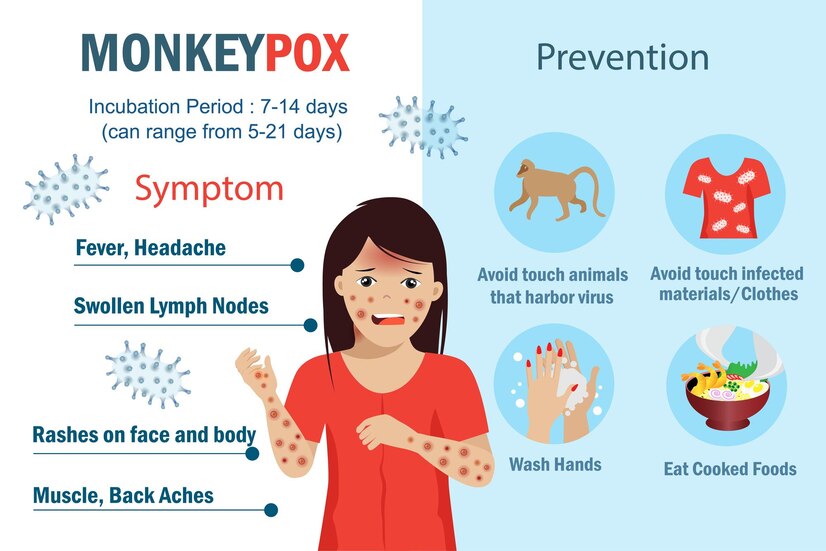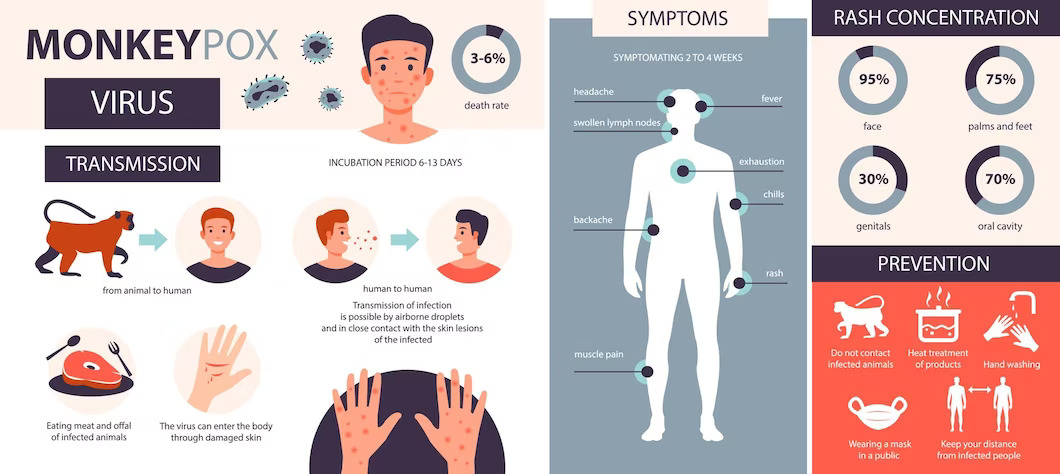What is Monkeypox and Should You Be Worried?
- 1 What is Monkeypox?
- 2 What is monkeypox?
- 3 Symptoms of monkeypox
- 4 Prevention of monkeypox
- 4.1 Get vaccinated:
- 4.2 Practice good hygiene:
- 4.3 Avoid contact with infected animals:
- 4.4 Cover your skin:
- 5 Should you be worried about monkeypox?
- 6 Conclusion
Monkeypox is a rare viral disease that has been making headlines recently. With its funny name and its association with cute primates, it may seem like a joke, but monkeypox is no laughing matter.
In fact, it can be a severe illness that can cause fever, rash, and even death in some cases. So what is monkeypox, and should you be worried about it? In this post, we’ll take a closer look at this disease and provide you with the information you need to know to stay safe and healthy. We’ll also try to inject some humour into the discussion because, let’s face it, we could all use a laugh these days. So, grab a banana (just kidding!) and let’s learn about monkeypox!
What is Monkeypox?
Monkeypox is a rare but potentiallyseveres viral disease that has been making headlines recently. The disease gets its name because it was first discovered in monkeys in 1958, but it can also be transmitted to humans. In humans, the symptoms of monkeypox can be similar to those of smallpox, including fever, rash, and body aches.
The recent news about monkeypox has understandably caused some concern among the general public. After all, it’s not every day that we hear about a disease that’s named after a monkey! However, it’s important to remember that monkeypox is still a relatively rare disease, and some measures can be taken to prevent its spread and treat those who are infected.
In this post, we’ll provide you with the information you need to know about monkeypox, including what it is, how it spreads, and what you can do to protect yourself. We’ll also try to inject a little humour into the discussion because, let’s face it, laughter is often the best medicine!
So, whether you’re worried about monkeypox or just curious to learn more about this fascinating disease, read on for all the information you need.
What is monkeypox?
Monkeypox is a rare viral disease that can cause a range of symptoms, including fever, headache, muscle aches, and a rash. It is caused by the monkeypox virus, which is closely related to the virus that causes smallpox. The disease was first identified in monkeys in 1958 in Africa, and the first human case was reported in 1970. Since then, monkeypox has been reported in several African countries, as well as in the United States, Europe, and Asia.
Monkeypis primarily spread through contact with infected animals or humans. The disease can be transmitted through direct contact with bodily fluids or skin lesions of infected animals, such as rodents or monkeys. It can also be transmitted through contact with contaminated bedding or clothing. In humans, the disease can be transmitted through respiratory droplets or contact with infected skin lesions.
Compared to smallpox, monkeypox is a milder disease with a lower risk of death. However, it can still be a serious illness, especially in people with weakened immune systems. The symptoms of monkeypox are similar to those of other viral diseases, such as chickenpox, but with some unique features, such as swollen lymph nodes and pustules in the rash.
Early detection and treatment aessentialant in managing monkeypox. Diagnosis can be challenging, as the symptoms can be similar to those of other diseases, but a combination of laboratory tests and clinical observation can help confirm the diagnosis. Treatment may include antiviral medications and supportive care, such as pain relief and hydration.
Overall, monkeypox is a rare disease that can be serious but is also preventable and treatable. You can help protect yourself from this disease by taking precautions to avoid contact with infected animals or humans and seeking medical attention if you develop symptoms.
Symptoms of monkeypox
The symptoms of monkeypox can vary widely, from mild to severe, depending on the individual and the severity of the infection. In general, the disease starts with a fever, headache, muscle aches, and other flu-like symptoms. This is followed by the appearance of a rash, which typically begins on the face and then spreads to different parts of the body.
The rash of monkeypox is distinctive, with small, raised bumps that turn into fluid-filled blisters. The blisters can then scab over and fall off, leaving a slight depression in the skin. The rash can be itchy, and some people may experience additional symptoms, such as swollen lymph nodes or respiratory symptoms.
While most cases of monkeypox are relatively mild, some people may develop more severe symptoms, including pneumonia, encephalitis (inflammation of the brain), or even death. People with weakened immune systems, such as those with HIV or cancer, are at greater risk of developing complications from monkeypox.
If you suspect that you or someone you know may have monkeypox, it’s essential to seek medical attention right away. While the disease is rare, early detection and treatment can help prevent complications and ensure a faster recovery. Your doctor may order laboratory tests to confirm the diagnosis and may prescribe antiviral medications or other medicines to manage the symptoms.
Overall, if you experience symptoms of monkeypox, such as fever and rash, it’s essential to to seek medical attention promptly. While the disease can be ssevere with proper care and treatment, most people are able to recover fully from monkeypox.
Prevention of monkeypox
Preventing monkeypox is all about avoiding exposure to the virus. Here are some tips on how to protect yourself and your loved ones:
Get vaccinated:
The best way to prevent monkeypox is to get vaccinated. The smallpox vaccine is highly effective at preventing monkeypox, as the two viruses are closely related. The vaccine is recommended for people who are at high risk of exposure, such as laboratory workers or people who work with animals. While the vaccine can cause some side effects, such as a sore arm or fever, these are usually mild and short-lived.
Practice good hygiene:
Monkeypox can be spread through contact with infected animals or humans, so it’s essential to practice good hygiene to reduce the risk of infection. This includes washing your hands regularly with soap and water, especially after coming into contact with animals or animal products. It’s also important to avoid touching your face, as this can help prevent the virus from entering your body.
Avoid contact with infected animals:
If you live in or are travelling to an area where monkeypox is known to occur, it’s essential to avoid contact with animals that may carry the virus. This includes rodents, such as squirrels and rats, as well as monkeys and other primates. If you must handle animals, wear gloves and other protective gear to reduce the risk of infection.
Cover your skin:
If you are at high risk of exposure to monkeypox, it’s a good idea to cover your skin as much as possible. This can help reduce the risk of infection, especially if you are coming into contact with animals or animal products. Wearing long sleeves and pants, as well as gloves and a mask, can help protect you from exposure.
Overall, prevention is the key to avoiding monkeypox. By getting vaccinated, practicing good hygiene, and avoiding contact with infected animals, you can help protect yourself and your loved ones from this rare but potentially severe disease.
Should you be worried about monkeypox?
While monkeypox may sound scary, the reality is that the risk of contracting the virus is relatively low, especially outside of Africa. Here are some things to consider:
Prevalence of monkeypox:
Monkeypox is most commonly found in central and West Africa. The virus can be found in both animals and humans, but it’s rare for people outside of these areas to contract the disease.
Likelihood of contraction:
While monkeypox can be severe, the chances of contracting the virus are still relatively low. In the United States, for example, there have only been a handful of cases reported in the past few decades. This means that most people don’t need to worry about monkeypox on a day-to-day basis.
Relative risk:
While monkeypox is undoubtedly something to be aware of, it’s essential to keep things in perspective. The risk of contracting other diseases, such as the flu or COVID-19, is much higher in most areas. It’s essential to take steps to protect yourself from these more common health concerns, as well as to stay informed about monkeypox and other less common diseases.
Staying informed:
The best way to stay prepared without becoming overly worried is to stay informed. Monitor news reports and official health sources for information about monkeypox and other potential health concerns. If you have specific concerns, don’t hesitate to seek advice from a healthcare professional.
Overall, while monkeypox is undoubtedly something to be aware of, the risk of contracting the virus is relatively low for most people. By staying informed and taking basic precautions, you can help protect yourself and your loved ones from this and other potential health concerns.
Now, let’s lighten things up a bit! While monkeypox is undoubtedly not a laughing matter, a little bit of humour can go a long way in alleviating any worries or fears.
Here are a few lighthearted jokes and humorous anecdotes related to monkeypox:
- Why did the monkeypox cross the road? To get to the monkey on the other side!
- Did you hear about the monkeypox outbreak at the circus? They had to close down the monkey house for disinfection. Apparently, it was a real chimpocalypse.
- I was feeling a bit worried about the monkeypox, so I went to see my doctor. She told me not to worry,and that I wwas justa bit of a hhypochondriac
- I heard that the best way to protect yourself from monkeypox is to avoid contact with monkeys. So, I guess it’s time to cancel my trip to the zoo.
While these jokes may not solve all of your worries about monkeypox, hopefully, they can bring a smile to your face and help to put things in perspective. Remember, it’s essential to stay informed and take basic precautions, but there’s no need to let fear take over. Stay safe, stay healthy, and don’t forget to have a little bit of fun along the way!
Conclusion
To sum up, monkeypox is a rare viral disease that can cause a range of symptoms, from fever and rash to more severe complications. While it’s understandable to be concerned about the disease, there are simple precautions you can take to protect yourself and your loved ones, such as practising good hygiene, getting vaccinated, and avoiding contact with animals that may carry the virus. If you suspect that you or someone you know may have contracted monkeypox, it’s essential to seek medical attention right away.
However, it’s also essential to keep in mind that monkeypox is a relatively rare disease, and the risk of contracting it is relatively low. By staying informed and taking basic precautions, there’s no need to be overly worried or anxious about monkeypox. Remember to keep calm, stay positive, and don’t forget to laugh a little along the way!
On that note, we’ll leave you with one final funny remark: What do you get when you cross a monkey with a potato? A chimpanzee! We hope this post has provided you with some helpful information and a few laughs along the way. Stay safe, and stay healthy!





















